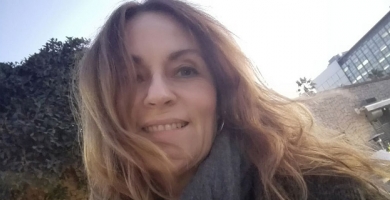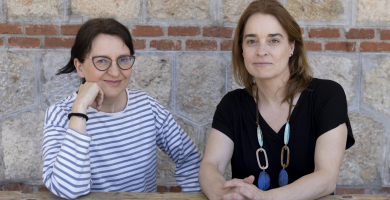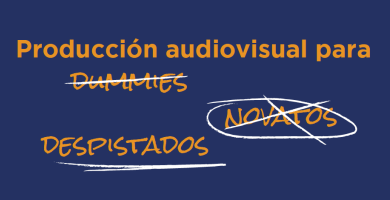
Conxa Orea: "The audiovisual sector is evolving very fast and the audience is increasingly demanding"
This month we interview Conxa Orea, TV3's executive producer. Nit i Dia, Merlí, Cites, Polseres Vermelles, Plats Bruts are some worth examples of her productions.

- What is the role of an executive producer? Which tasks do you have to develop?
An executive producer is the ultimate responsible for the project, either a series or a TV show, a movie, or any audiovisual project. The executive producer has to get involved and ensure an optimal quality in all parts of the project: content, language, budget, work plans... In short, it has to be a good product for the audience it is directed. And at the end, we also want to be successful, of course! This is what we want.
We work as a team, I mean, there is more than one executive producer for each project. Each of us brings talent to a part of the project, depending on their experience, but all have the same goal, getting the product that we think audiences want to see.
- Is there any difference between carrying out the executive production of a TV series or in a movie?
Essentially the goal is the same, but the media, in television and movies, makes the difference.
The film industry is much more complex than the TV sector. There are many more agents involved, such as producers, distributors, exhibitors... Production processes may be similar in television and film, in fact they are getting closer, but the route of a film, from the idea to its developing and its release in cinemas can be long and difficult.
- Which vision of the city of Barcelona do you want to give in the series produced by TV3, such as Nit i Dia or Cites?
The truth is that we we are looking for a good story that is well told. This point has emerged in series such as Cites, Nit i Dia or Merlí. I mention these three because they are the last that we have produced.
In the case of Cites, we found that Barcelona was a good setting in which to explain the character's stories. From there we wanted to shoot in different districts of Barcelona, fleeing from the tourist spots and it emerged an image of Barcelona as a modern city, with many attractions and places to discover. Even there were people, fans of the series, which were put in touch with us to find out where was that restaurant or street, or bar. Filmax team did an excellent job.
In the case of Nit i Dia the space marked the history, because we needed to shoot in the City of Justice and the Institute of Legal Medicine. It was necessary and essential to explain the series. The team of Mediapro had this idea since the very beginning. In this case, we are giving an overview of the world of forensics and criminal investigation, but it is a real image because the action happens in real Barcelona's scenarios.
- What do you think about the city of Barcelona as a film set in series, tvmovies or films?
I think that Barcelona is an excellent set, we can find everything here! Beautiful spots, tourist attractions, old city, modern city... Barcelona is colorful and full of life and it has very different spaces. Another important factor is the weather, we have an ideal climate to shot outside, we have bright and warm temperatures almost all year. And the sea, of course.
What we do not have is "film culture". When you go shooting through Barcelona's streets and neighborhoods, you sometimes feel that you are bothering people, the neighbors. We still need to improve this problems and this relationship with them.
- What is your relationship as executive producer with the Barcelona Film Commision?
We started working with the Barcelona Film Commission with Cites, when we needed to expedite permits to shoot through the streets of Barcelona. Until then, most series had been produced in largely sets, even if they were natural, as in the case of Polseres Vermelles that was shot in a real hospital. Regarding Cites, the whole city was set. Filmax production team had to make many steps and procedures and hence the Film Commision had his paper.
- How do you value the work of the Barcelona Film Commission?
I think they are doing a great job and it is important to be there. We need to collaborate together. I think that the audiovisual sector is evolving very quickly, changing language, technology, quality. The public is increasingly demanding in the case of the television series. The sets must be plausible, comprehensive and of course, not see the trap, light as close to reality as possible...and we have a city that is an excellent set.










